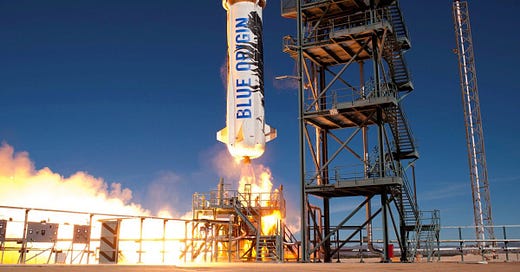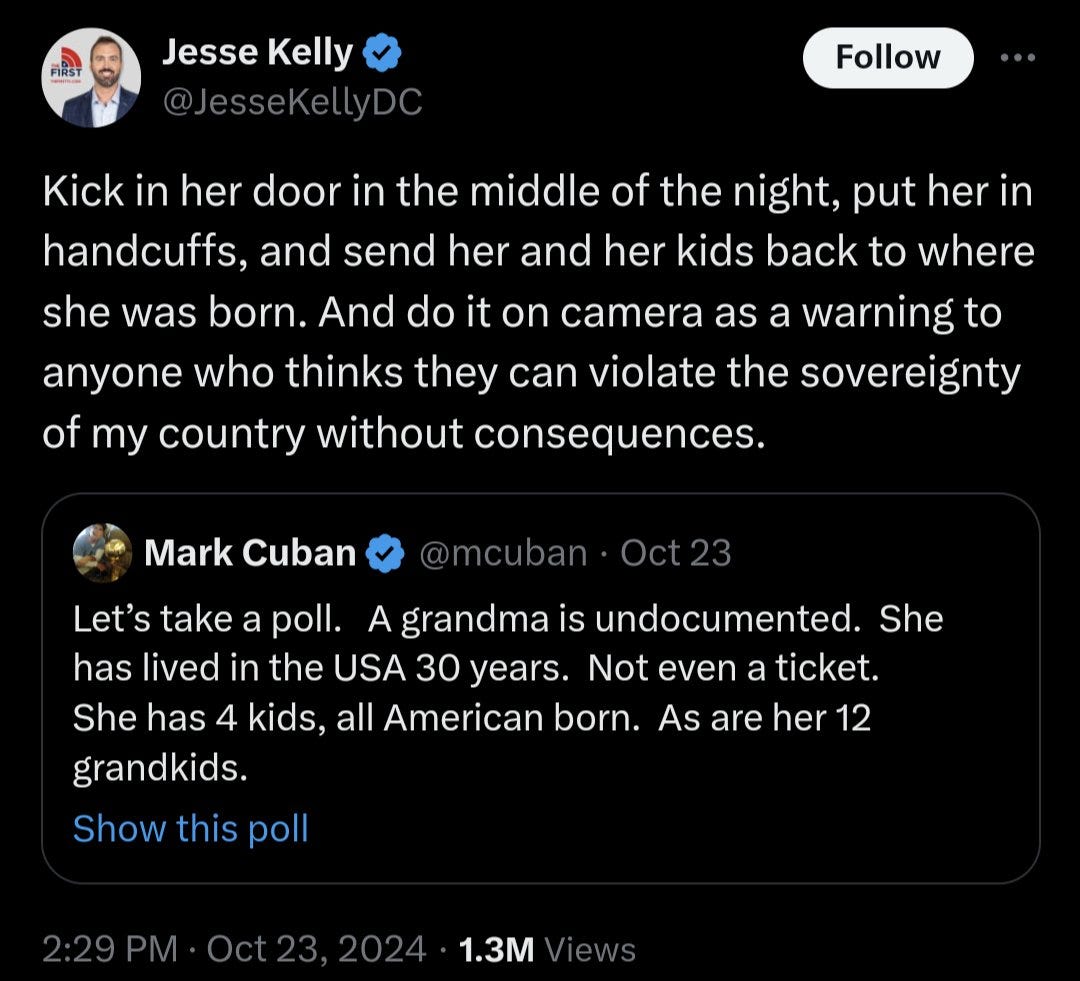Quick personal note: I’m headed to visit the family in France, which is where I’ll be spending election night — watching the whole thing from across the Atlantic. I’m not sure this will actually change my perspective on any of this, but subscribers will receive a series of “Letters from France” — contrarian with a Gallic touch — as all of this unfolds.
To the Contrary is a reader-supported publication. You may disagree with me from time to time (and I expect you will, because I’m not promising you a safe space here). But I’ll always try to give it to you straight. To receive new posts and support my work, consider becoming a free or paid subscriber. (And I’m immensely grateful for your generous support.)
Happy Sunday. There are nine days until the Election, and I think we need to start today with the dog pictures.
**
**
Premature capitulation
So, it turns out that narcissistic billionaires are not going to save us. Why did anyone ever think they would?
By now, you know the story: the oligarchic owners of the LA Times and the venerable Washington Post — Patrick Soon-Shiong and Jeff Bezos, respectively —exercised their royal prerogative to quash editorial endorsements of Kamala Harris. We can quickly dispense with attempts to rationalize or whitewash the decisions. The Wapo publisher’s explanation is eyewash, mixed with bullshit, with a strong pissing-down-our-backs-and-telling-us-that-it’s-raining vibe.
There’s nothing mysterious or puzzling about what happened here. As Puck notes:
Bezos’s Amazon has highly lucrative government contracts, after all, and, in a stroke of particularly bad timing, Trump met with executives from Bezos’s aerospace company, Blue Origin, on Friday. Soon-Shiong once sought an appointment as Trump’s healthcare czar and has other business interests pending federal regulatory review.
So less than two weeks before the election, writes Oliver Darcy, the billionaires chose “to preemptively bend the knee to an autocratic wannabe, throwing their newspapers into turmoil and abdicating their responsibilities as media owners.”
Former Wapo editor Marty Baron called the decision “cowardice, with democracy as its casualty.” He described Bezos’s veto of the endorsement as “Disturbing spinelessness at an institution famed for courage.” And he warned that Trump will see the capitulation “as an invitation to further intimidate owner Jeff Bezos (and others).”
In other words, they groveled prematurely. And therein lies the tale.
Let’s begin by stipulating several things: (1) This was a business decision and the owners have the right to do this because the freedom of the press belongs to the guy who owns the presses; (2) the editorial endorsements would not have moved many (if any) votes; and (3) as I’ve long argued, newspaper editorials are anachronisms, and often a bad idea.
But unless you’ve completely lost the plot, that isn’t the story here. And even though it is the biggest media story of the cycle, the truckling of the billionaires isn’t just a media story.
It’s much worse. This is how democracy dies. Not in darkness, but in transactional capitulation. The newspapers are merely collateral damage.
Bezos shreds the Post’s reputation
Let’s start with the blowback.
I NEVER EXPECTED TO SEE THE DAY when the Washington Post would kneel before Donald Trump…
Silence, after all, will not offend the authoritarian should he win. Silence, after all, is more than Trump can reasonably expect from the Post. Democracy may die in darkness, as the Post’s motto goes, but silence is apparently a good hedge….
And, he writes, it is time to get over the notion that democracy can rely on the favor of billionaires.
IF EVER THERE WERE an incident that stands for the proposition that democracy, and journalism, cannot rest on the shoulders of oligarchs, this is it. Bezos did a lot of good for the Post when he first took it over, but the consent of the billionaire is not a stable structure for newspapers or magazines in an authoritarian era. Eventually, they can be counted upon to protect themselves, and that may sometimes mean not speaking the truth—either by lying or, as here, just by not speaking at all.
**
The Wapo’s former media columnist Magaret Sullivan: “We needed courage. We got cowardice.”
There’s no other way to see this other than as an appalling display of cowardice and a dereliction of their public duty…
The papers’ leaders have made it clear that they either want Trump (who is, after all, a boon to large personal fortunes) or that they don’t wish to risk the ex-president’s wrath and retribution if he wins. If the latter was a factor, it’s based on a shortsighted judgment, since Trump has been a hazard to press rights and would only be emboldened in a second term.
**
Eighteen Post columnists responded to the decision not to endorse:
The Washington Post’s decision not to make an endorsement in the presidential campaign is a terrible mistake.
It represents an abandonment of the fundamental editorial convictions of the newspaper that we love.
This is a moment for the institution to be making clear its commitment to democratic values, the rule of law and international alliances, and the threat that Donald Trump poses to them — the precise points The Post made in endorsing Trump’s opponents in 2016 and 2020.
There is no contradiction between The Post’s important role as an independent newspaper and its practice of making political endorsements, both as a matter of guidance to readers and as a statement of core beliefs.
That has never been more true than in the current campaign. An independent newspaper might someday choose to back away from making presidential endorsements. But this isn’t the right moment, when one candidate is advocating positions that directly threaten freedom of the press and the values of the Constitution.
**
Let's be clear here. Bezos is a smart man. Surely, he knew that his move would be devastating to the legacy and reputation of the Washington Post.
And he chose to do it anyway. Protecting his Blue Origin Penis-Rockets was more important to him than the paper or democracy.1
**
All of this would drip with irony if irony had not been fed into a wood-chipper years ago. “Conservatives” used to warn against big government, because they feared exactly this sort of thing. They used to say things like: “A government big enough to give you everything you want is a government big enough to take from you everything you have.”
As David Frum noted yesterday, “When I was a young man discovering Friedrich Hayek, I worried about state retaliation against businesses that exercised legal speech rights.” A vengeful state that governs with fear and favor was presumably not what conservatives had in mind when they talked about either small government, or free markets. But Frum writes, “DeSantis and Trump have made state retaliation against business speech a central principle of the conservative movement.”
And the fear extends beyond just the media.
As Darcy noted: “The decisions from Bezos and Soon-Shiong are part of a larger trend amongst business leaders. The last wish of anyone in the business community is to land on Trump's so-called enemies list, given that he has made it abundantly clear he will weaponize government if he wins office to punish those who spoke out against him.”
In other words, the masters of the universe are taking Trump’s threats both seriously and literally.
“This is very, very bad news,” wrote Matt Bennett: “Not because a WaPo editorial would move votes in swing states - it wouldn't. But Bezos's extreme wealth was supposed to insulate the Post from fear or favor. Clearly, it does not.”
Obeying in advance
The cool kids have decided that it is gauche to use words like “fascist” to describe the Mango Mussolini.2 But as, Timothy Snyder wrote in “On Tyranny,” the pre-emptive forelock-tugging of the rich is a feature, not a bug.
A problem with the very wealthy is that, alas, the least vulnerable have a tendency to think of themselves as the most vulnerable.
And from that position they harm everyone else, while proclaiming that they are simply being neutral or following business interests. But doing what Trump wants in advance only makes it more likely that Trump will have power, and only teaches him that you are easy to intimidate. You are giving the authoritarian power he would not otherwise have. The irony is that the rest of us will have to save the billionaires from their own cowardice.
**
This piece by Ian Bassin and Maximillian Potter was prophetic: On anticipatory obedience and the media - Columbia Journalism Review.
Trump’s campaign against the Fourth Estate has been unfolding before our eyes—far more effectively than some in the press would like to believe.
We have examined Trump’s public statements, and put them together with the actions of the government and of media outlets over the past eight years, and we fear that, despite the conventional wisdom that American media independence survived the tests of Trump’s first term unscathed, developments in the years since he left office tell a different story. That story is that, like Orbán’s, Trump’s campaign against the media has taken time to have its intended effect, but have an effect it has, and the trajectory discernible now, in hindsight, doesn’t bode well for the media should Trump return to power….
As a candidate, Trump often denigrated media he disliked; he took particular aim at CNN (“fake news,” “garbage”) and the Washington Post (“a disgrace to journalism”).
As CNN and the Post continued to report on Trump in ways he did not like, he openly threatened that, if elected, he would seek revenge against them. At a rally in early 2016, he called out Amazon and its founder, Jeff Bezos, owner of the Post, and said: “If I become president, oh do they have problems. They’re going to have such problems.”
Whither Never Trump?
David French: Four Lessons From Nine Years of Being ‘Never Trump’ - The New York Times.
When Trump announced his first run for president, his vitriolic speech planted a seed of hatred in the American body politic. That seed found fertile soil.
If I could talk to my 2015 self, I’d deliver a simple, dispiriting message: There isn’t a specific tactic or argument that will win back the Republican Party from Donald Trump.
You’ve already lost.
**
Politico Playbook: Never Trump faces the ever after
“I would like to think that we could kind of close up the stand, have a garage sale and go back to our lives,” Sykes told Playbook while driving to Ripon, Wisconsin, the birthplace of the Republican Party. “Then the conservatives in the Never Trump movement would shift into the loyal opposition again. But I don’t see that happening.”
Finally…
Behold the ugliness unleashed…
As Rick Wilson points out, this is not likely to end well for the phallic rocket man.
What Bezos fails to understand is that his gesture of submission will earn him no favor from Trump. Autocrats do not reward compliance—they punish weakness. Imagine a moment when Bezos needs a favor in Trump’s second term. The answer won’t be a gracious acknowledgment of past obeisance.
It will be swift and merciless:"Hi, Jeff. This is deputy assistant to President Chad Smith. No, he can’t take your call. Sorry, Jeff. We had to cancel Blue Origin’s contract. Elon gets it instead. You didn’t support the President, you didn’t donate, and your newspaper was hostile to him."
And Bezos will sit in stunned silence, realizing too late that one act of submission only invites further demands. Tyrants revel in humiliating those who bow before them. Their cruelty knows no limit, and any reward for capitulation is fleeting at best. History teaches us this lesson with grim clarity: autocrats, from Putin to Xi Jinping, demand not mere loyalty but absolute submission.










I immediately canceled my subscription of WAPO. I know Bezos won’t care and it hurts journalism there. But I intend to use that money to subscribe to other organizations whose owners/management understand the peril of the time. Enjoy the time in France Charlie and hope you come back stateside without contemplating a permanent move there.
Mercy, what a bon voyage note! I don’t think I have disagreed with a word you’ve written in a long time, though what you were saying is usually dismaying to me. The realistic clarity of this particular post may be your best to date. I don’t know why I take solace in having someone who I know would disagree with me about many political policy positions Harris will have (I am an East Texas liberal Democrat, something of a rare bird) But maybe it’s because it reminds me that civility is not a sign of weakness, and that the strength of a pluralistic democratic society is its ability to recognize that our shared values need not be dependent upon the particular details of a policy paper but the fundamentals of those values. Thank you for my Sunday morning, meditation on our political world, and you guys have a wonderful trip!